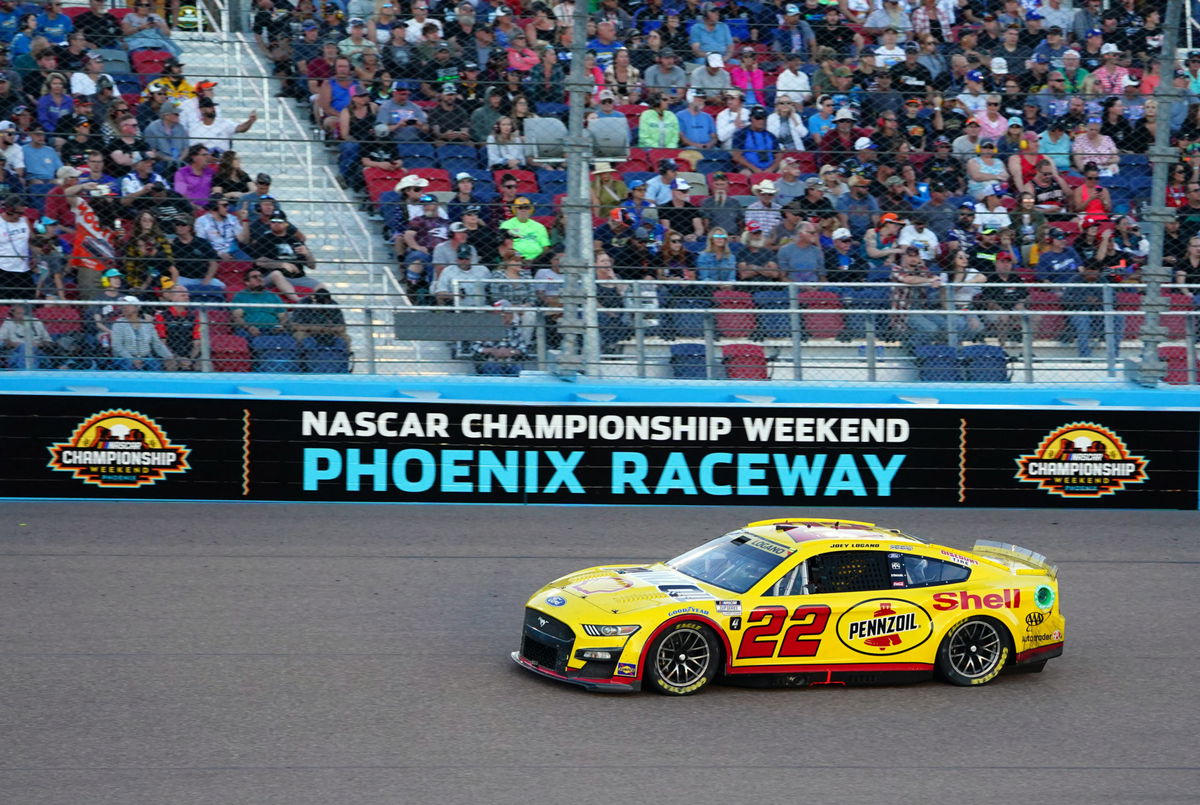
USA Today via Reuters
Nov 6, 2022; Avondale, Arizona, USA; NASCAR Cup Series driver Joey Logano (22) races in the final laps of the Cup championship at Phoenix Raceway. Mandatory Credit: John David Mercer-USA TODAY Sports

USA Today via Reuters
Nov 6, 2022; Avondale, Arizona, USA; NASCAR Cup Series driver Joey Logano (22) races in the final laps of the Cup championship at Phoenix Raceway. Mandatory Credit: John David Mercer-USA TODAY Sports
Moments after FOX Sports’ NASCAR panel wrapped up its latest debate, the conversation spilled into social media feeds and fan forums with unusual intensity. What began as a seemingly routine discussion about the playoff system quickly escalated into one of the most pointed disagreements to surface in recent coverage of the sport. Longtime insiders, veteran spotters, and respected journalists found themselves dissecting what exactly a “champion” in NASCAR should represent: the best driver across a season, or the team most capable of executing flawlessly when everything is on the line.
Watch What’s Trending Now!
For NASCAR, where history and tradition often weigh just as heavily as innovation, the debate underscored more than semantics; it touched the very core of competitive legitimacy.
Championship debate: driver vs. team recognition
The spark came from Mamba Smith’s eyebrow-raising post on X, where he suggested, as explained by the insider during the podcast: “the point isn’t to crown the best driver… it’s to crown the best team who executed the best when the pressure was at its highest.” The language wasn’t just provocative; it hit directly at the foundation of how NASCAR champions are perceived. While NASCAR has always marketed its winners as individual stars, insiders know the road to the Cup is paved with mechanical precision, strategy calls, and flawless pit work. Smith’s blunt framing, however, made it sound as though the driver was an afterthought, which triggered pushback.
Freddie Kraft, speaking on the FOX panel, pushed back sharply: “You never wanna say the point is not to crown the best driver… The driver is the champion… and you want the best driver in your series to be your champion.” Kraft’s comments reflected a central anxiety in today’s playoff era. We saw the fan uproar when Joey Logano was able to clinch the championship last year. All it took was one fuel-saving win at Nashville and some good luck at Charlotte Roval. And in Phoenix, he executed a clean race to bag the biggest price in NASCAR.
Under this system, one untimely issue can wipe out an entire season of dominance. Who can forget last year’s race manipulation at Martinsville that forced Christopher Bell to pull off a Hail Melon 2.0? Whereas in stick-and-ball sports, a playoff typically still reflects cumulative team performance, NASCAR’s all-or-nothing one-race format often reduces a title chase to a razor’s edge of luck and timing. Bob Pockrass, one of NASCAR’s most respected journalists, made that very point on the broadcast: “As I always say… this isn’t like other sports… NCAA championship game… when the guy takes a shot… the ball doesn’t all the sudden deflate. At Phoenix… you could have something happen… that can take away a great season.”
View this post on Instagram
His analogy resonated with fans frustrated by the all-in nature of Phoenix deciding everything, especially when mechanical failures or accidents unrelated to driver skill can derail a year’s worth of dominance. Pockrass further noted: “You can beat somebody else for nine straight weeks… and then the one week not beat them… and not be the champion,” summing up the tension of a system that thrills networks but leaves purists uneasy.
Tommy Baldwin added another layer, reframing the conversation around teamwork: “At the end of the day, yeah… we talk about the driver winning the championship… but it is the team. The driver gets the most recognition… but if it wasn’t for us, the spotters, the pit crews, the shop people, and the office making decisions… there’s a lot that goes into this.” Baldwin’s perspective aligned more closely with Smith’s, albeit in less controversial terms, reminding fans that NASCAR wasn’t born as an individual-only sport. His comments highlighted an uncomfortable truth: a championship in modern NASCAR is never solely about “the guy behind the wheel.”
The differing takes illuminated the growing divide between how insiders interpret the playoff system and how fans expect “greatness” to be rewarded. While Kraft and Pockrass worried over optics and legitimacy, Smith and Baldwin underlined the contributions of those working outside the spotlight. It was less about determining who was right and more about exposing the fragile credibility of NASCAR’s crowning moment.
Insiders react to Alex Bowman’s Richmond frustration
As the NASCAR Cup Series playoffs heated up at Richmond Raceway, tension boiled over not just on the track but on the radio airwaves. Alex Bowman, fighting to secure a playoff spot, unleashed a rare and pointed outburst over team radio, accusing lapped cars of “race manipulation” for blocking his path during a crucial run to catch leader Austin Dillon. Bowman’s frustration highlighted the high stakes and razor-thin margins drivers face late in the season.
Navigating through dense lapped traffic is always a challenge, but Bowman’s situation became particularly contentious because the cars ahead included Jesse Love and Shane van Gisbergen, the latter stuck racing alongside Love, who happens to be a teammate of playoff contender Austin Dillon. Bowman’s spotter tried repeatedly to get van Gisbergen to move, lamenting that “they’re not going to help… they hate us.” Over the radio, Bowman angrily exclaimed, “His teammate is just f****** blocking me now. This is race manipulation, but whatever.”
NASCAR insiders quickly weighed in on the fallout. Freddie Kraft pointed out, “I think the race manipulation he was bit****g about was Jesse Love, right? He felt like Jesse was blocking him… which is a teammate of the 3,” Kraft explained. Bob Pockrass also said, “At first I thought maybe SVG’s thinking, well, I’d much rather race Austin Dillon in the playoffs than Alex Bowman… is that a strategy? Can you block somebody to keep them out of the playoffs? Is that okay?” This raised the thorny question of whether blocking to influence playoff outcomes is “strategy” or unfair gamesmanship.
Meanwhile, Bowman himself downplayed the incident post-race but admitted the playoff fight is “certainly stressful,” underscoring how tiny moments can define a driver’s postseason fate. It is worth noting, Bowman is the only HMS driver to secure his playoffs spot, so he is feeling the heat. Nothing but a win at Daytona would do the job for him, and he is not the only one fighting to make it to the top 16.








